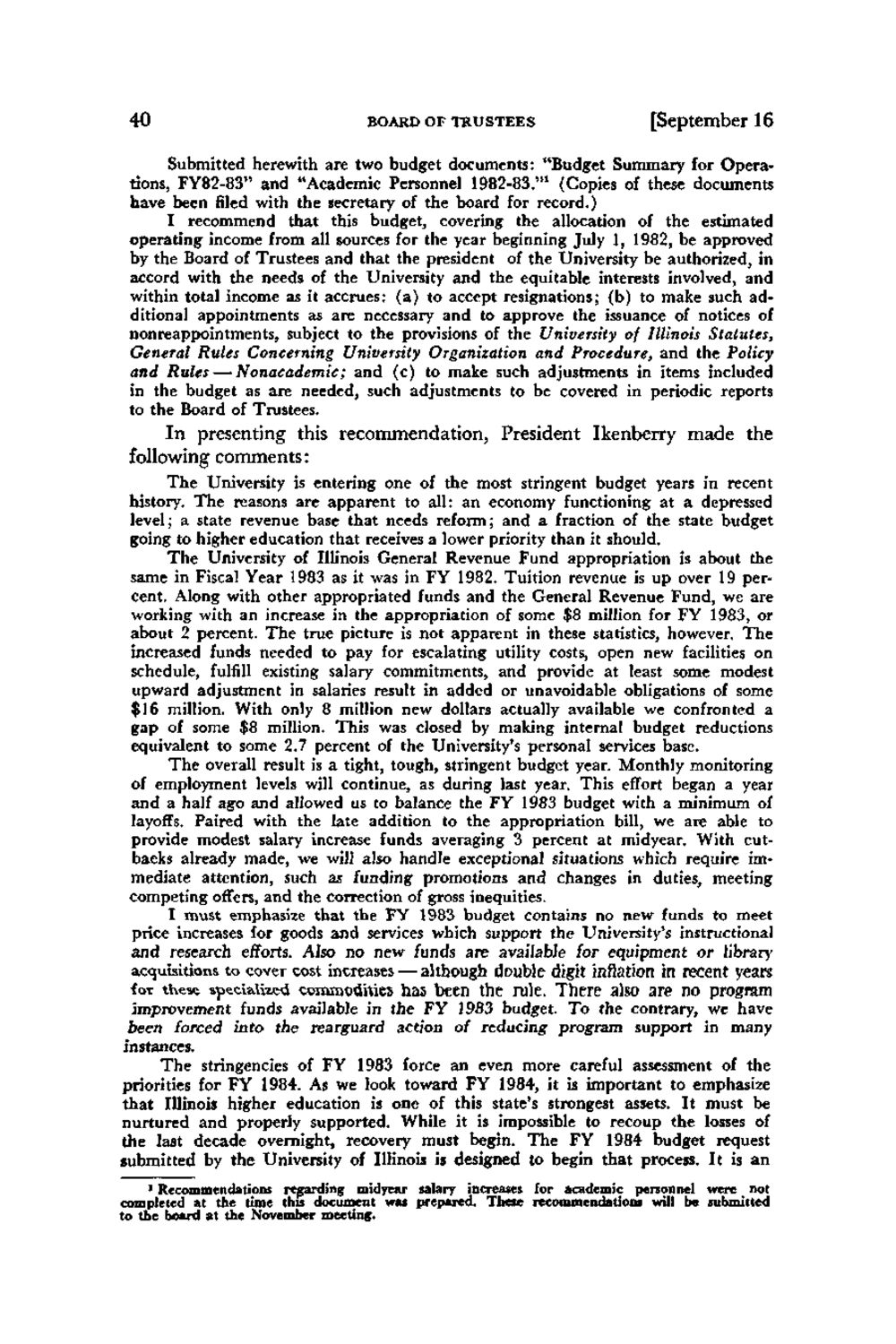| |
| |
Caption: Board of Trustees Minutes - 1984
This is a reduced-resolution page image for fast online browsing.

EXTRACTED TEXT FROM PAGE:
40 BOARD OF TRUSTEES [September 16 Submitted herewith are two budget documents: "Budget Summary for Operations, FY82-83" and "Academic Personnel 1982-83." 1 (Copies of these documents have been filed with the secretary of the board for record.) I recommend that this budget, covering the allocation of the estimated operating income from all sources for the year beginning July 1, 1982, be approved by the Board of Trustees and that the president of the University be authorized, in accord with the needs of the University and the equitable interests involved, and within total income as it accrues: (a) to accept resignations; (b) to make such additional appointments as are necessary and to approve the issuance of notices of nonreappointments, subject to the provisions of the University of Illinois Statutes, General Rules Concerning University Organization and Procedure, and the Policy and Rules — Nonacademic; and (c) to make such adjustments in items included in the budget as are needed, such adjustments to be covered in periodic reports to the Board of Trustees. In presenting this recommendation, President Ikenberry made the following comments: The University is entering one of the most stringent budget years in recent history. The reasons are apparent to all: an economy functioning at a depressed level; a state revenue base that needs reform; and a fraction of the state budget going to higher education that receives a lower priority than it should. T h e University of Illinois General Revenue Fund appropriation is about the same in Fiscal Year 1983 as it was in FY 1982. Tuition revenue is up over 19 percent. Along with other appropriated funds and the General Revenue Fund, we are working with an increase in the appropriation of some $8 million for FY 1983, or about 2 percent. The true picture is not apparent in these statistics, however. The increased funds needed to pay for escalating utility costs, open new facilities on schedule, fulfill existing salary commitments, and provide at least some modest upward adjustment in salaries result in added or unavoidable obligations of some $16 million. With only 8 million new dollars actually available we confronted a gap of some $8 million. This was closed by making internal budget reductions equivalent to some 2.7 percent of the University's personal services base. The overall result is a tight, tough, stringent budget year. Monthly monitoring of employment levels will continue, as during last year. This effort began a year and a half ago and allowed us to balance the FY 1983 budget with a minimum of layoffs. Paired with the late addition to the appropriation bill, we are able to provide modest salary increase funds averaging 3 percent at midyear. With cutbacks already made, we wil] also handle exceptional situations which require immediate attention, such as funding promotions and changes in duties, meeting competing offers, and the correction of gross inequities. I must emphasize that the FY 1983 budget contains no new funds to meet price increases for goods and services which support the University's instructional and research efforts. Also no new funds are available lor equipment or library acquisitions to cover cost increases — although double digit inflation in recent years for these specialized commodities has been the rule. There also are no program improvement funds available in the FY 1983 budget. To the contrary, we have been forced into the rearguard action of reducing program support in many instances. The stringencies of FY 1983 force an even more careful assessment of the priorities for FY 1984. As we look toward FY 1984, it is important to emphasize that Illinois higher education is one of this state's strongest assets. It must be nurtured and properly supported. While it is impossible to recoup the losses of the last decade overnight, recovery must begin. T h e FY 1984 budget request submitted by the University of Illinois is designed to begin that process. It is an 1 Recommendations regarding midyear salary increases for academic personnel were not completed at the time this document was prepared. These recommendations will be submitted to the board at the November meeting.
| |